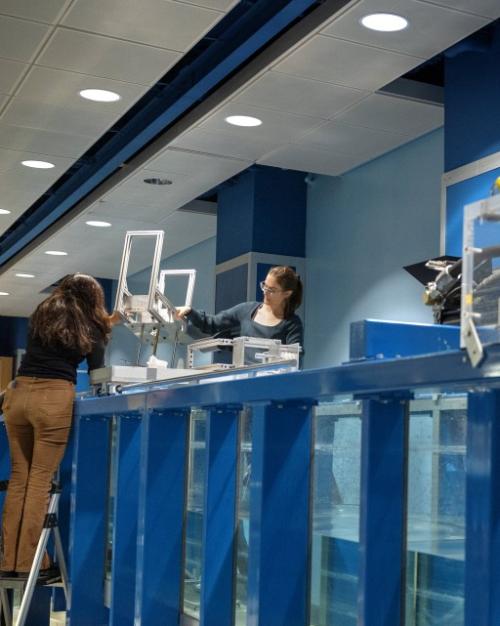The oncogene RAS is the most frequently mutated gene of its type in human cancer. Active mutants are found in 60 to 90 percent of cases of pancreatic cancer, and a significant portion of colorectal and lung cancers.
Among all RAS-driven cancers, the most frequently mutated gene is KRAS. Two variants of this gene – K-Ras4A and K-Ras4B – also have important signaling functions and can promote cancer cell proliferation if mutated, so gaining a better understanding of their regulation and function could lead to development of improved cancer therapeutics.
Two new studies led by Hening Lin, professor of chemistry and chemical biology, offer new insights into this important protein. The first study identifies an enzyme – SIRT2, one of seven mammalian sirtuins to which Lin’s lab has devoted much study – that helps promote K-Ras4A’s interaction with specific proteins to promote the growth of cancer cells.
Hui Jing, Ph.D. ’17, and Xiaoyu Zhang, Ph.D. ’17, are co-lead authors of “SIRT2 and Lysine Fatty Acylation Regulate the Transforming Activity of K-Ras4a,” published Dec. 14, 2017, in eLife. Maurine Linder, professor and chair of the Department of Molecular Medicine in the College of Veterinary Medicine, also contributed significantly.
The second study investigates the functional specificities of K-Ras4a and K-Ras4b, which are nearly identical but whose signaling functions are dependent on the proteins with which they interact. An improved proteomic approach allowed the identification of many shared and differential interacting proteins and their corresponding functions.
Zhang was the lead author on “Comparative Nucleotide-Dependent Interactome Analysis Reveals Shared and Differential Properties of K-Ras4a and K-Ras4b,” published Dec. 20, 2017, in ACS Central Science, a publication of the American Chemical Society.
The Lin Lab has long focused on the roles played by sirtuins – SIRT1 through SIRT7 – in regulating numerous biological pathways, including genome stability, metabolism and longevity. They are considered promising targets for treating several human diseases, including cancer, and work on SIRT2 led Lin to K-Ras.
The protein is switched on and off depending on various signals, but a mutation causes the protein to be left in the “on” position, which has the potential to turn normal cells into cancerous ones.
“Normally when the cells receive growth factor signaling, the K-Ras protein will be activated, and they will interact with other proteins downstream and activate those proteins and promote cell proliferation,” said Lin, a Howard Hughes Medical Institute investigator. “But activity has to be carefully regulated. If it’s always ‘on,’ they signal for growth and proliferation and they cause a tumor.”
In the first study, Lin and his group discovered that SIRT2 can promote the localization of K-Ras4A on intracellular membranes, where their interaction with specific proteins promote cancer cell growth. Furthermore, Lin said, the findings suggest SIRT2 inhibitors could help treat K-Ras mutant-driven cancers; future work will strive for better inhibitors with stronger anti-cancer activity.
The second study identified both known and previously unknown interacting proteins with K-Ras4a and K-Ras4b, and opened the door for further study of the Ras superfamily of proteins known as small GTPases, of which there are more than 150 members. Lin said research could be expanded to other small GTPases to gain useful biological insights into other cell-signaling pathways.
“We still don’t quite understand all the data yet,” he said. “This paper is essentially presenting these data and analyzing just a small portion of it. There is much more to study.”
Research for both studies was conducted at the Cornell Biotechnology Resource Center’s Imaging and Proteomics facilities. Both studies were supported by grants from the National Institutes of Health, as well as the Howard Hughes Medical Institute.
This article also appeared in the Cornell Chronicle.




